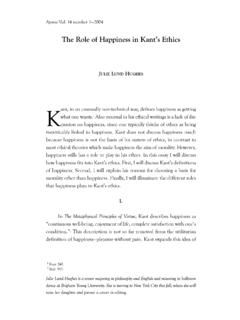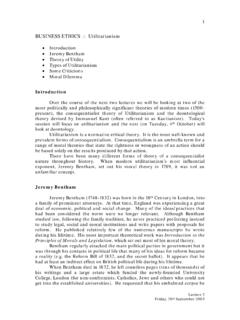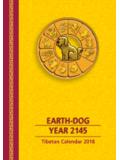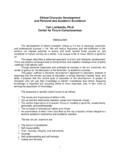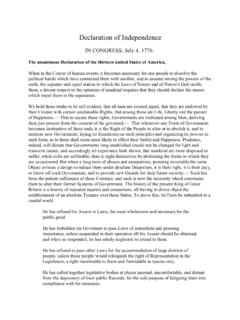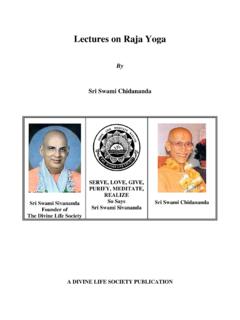Transcription of Money Can Buy Happiness - Reason Papers
1 Reason Papers Vol. 26. Money Can Buy Happiness Tara Smith University of Texas at Austin Money is underrated. That claim may seem ridiculous, in an era of conspicuous consumption. One hardly need belong to the superrich to drive an imposing SUV, dine out frequently at ever better restaurants, shovel grunt work to a housekeeper, pamper oneself with pick-me-ups (facials, massages) once reserved for the upper echelons, or have one's daily routine facilitated by technological conveniences undreamed of a few decades ago. Shopping and charging have become national addictions. At the same time that the appetite for material goods seems insatiable, people are commonly plagued by clouds of guilt. Some part of them views material desires as a vice. Students identifying themselves as business majors characteristically inject a self-deprecating remark to pre-empt others'. anticipated criticism of their 1interest in Money . The familiar analysis is that people today are too materialistic, that thirst for stuff has crowded out more worthy pursuits.
2 Our obsession with material goods has created imbalances;. workaholics complain of inadequate time to enjoy their riches. The very term consumer society is usually a derisive rather than a neutral description of modern life1. Money at least at the theoretical level is persistently attacked from left and right alike. Witness recent protests at World Trade Organization meetings and complaints against pharmaceutical companies, lamenting the power of the rich. Or listen to rightwing social commentators (such as William Bennett, Gertrude Himmelfarb, Hilton Cramer) who warn that having it too easy corrupts our virtue, makes us soft, and spoils our Across the political spectrum, all agree that the materially successful bear a responsibility to give back to their communities, implying that prosperity means that one has taken too much. 1 Andrew Hacker speaks for many when he disparages personal purchases and writes that being the leader in consumption is not necessarily cause for congratulation.
3 Money Who Has How Much and Why (New York: Scribner, 1997), 19. The Voluntary Simplicity movement of recent years seeks to restore less materialistic priorities, urging people to cut back on both work and possessions. See Joe Dominguez and Vicki Robin, Your Money or Your Life (New York: Viking, 1992); Sarah Ban Breathnach, Simple Abundance (New York: Warner Books, 1995); or, for a brief description of the movement, Robert Frank, Luxury Fever (New York: The Free Press, 1999), 187 ff. 2 Dinesh D'Souza, The Virtue of Prosperity (New York: The Free Press, 2000) 39-48. D'Souza also tells of a friend who maintains that the country was saved by the Great Depression. Reason Papers 26 (Summer 2000): 7-20. Copyright 2000. 7. Reason Papers Vol. 26. Religion has long warned against the lure of material goods. Christian Scripture is explicit in several places. It is easier for a camel to go through the eye of a needle than for a rich man to enter the kingdom of heaven.
4 To merit eternal life, Jesus instructs us to sell all our possessions and give the Money to the poor. Timothy writes that the desire for riches plunges men into ruin and destruction. For the love of Money is a root of all sorts of evil. 3. Church fathers since have remained, at best, suspicious of Money , often condemning usury and luxurious living, warning against Money as a distraction from God and a temptation to In recent years, economists have added to this spiritual assault the weight of social science data, concluding from studies of people's income and life-satisfaction levels that the truism Money can't buy Happiness really is I beg to differ. In an important sense, Money can buy Happiness . Money can be misspent, to be sure. The relationship between Money and Happiness is not one of simple, seamless cause and effect. Conventional wisdom woefully minimizes the value of Money , however. And in doing so, it sabotages people's capacity to be happy.
5 For this Reason , my aim in this paper is to clarify the relationship between Money and Happiness . To do that, I shall first sketch the basic nature of Money and the basic nature of Happiness . I will then explain the manner in which Money contributes to Happiness , adding some clarifications before concluding. 1. Money Money is a token of exchange that facilitates trade. The use of Money marks a monumental improvement over barter because of Money 's flexibility. This is elementary economics, but it will be useful to refresh ourselves, so as to isolate Money 's value. Since a monetary currency can be traded for all manner of goods and services, its employment liberates an individual from trading exclusively with those who not only offer the things that he would like, but who are simultaneously seeking the very products that he has to offer. (Under a barter system, for instance, the baker must need a haircut in order to have incentive to sell bread to the barber).
6 The convertibility of Money into an array of goods and services astronomically expands the value of an individual's products. By extending the range of other people with whom a person can advantageously 3 Mark 10: 23-27; Mark 10: 17-22; 1 Timothy 6: 8-11, New American Standard Bible (Carol Stream, Ill: Creation House, 1973). Among other relevant passages, see Luke 6: 21-25, and Luke 12: 16-35. 4 For a good account of Christianity's historical attitudes toward Money , see Jacob Viner, Religious Thought and Economic Society (Durham, NC: Duke University Press, 1978). 5 Such studies are reported in Frank, 6, 65; Robert E. Lane, Does Money Buy Happiness ? The Public Interest (no. 113, Fall 1993): 56-65; David Leonhardt, If Richer Isn't Happier, What Is? New York Times May 15, 2001, national edition: A15. & 17. 8. Reason Papers Vol. 26. trade, Money multiplies his options; it multiplies the purposes to which his wealth can be put. As Georg Simmel observed, the value of a given quantity of Money exceeds the value of the particular object for which it is exchanged, because it makes possible the choice of any other object in an unlimited the choice that it offers is a bonus which increases its value.
7 6 In short, thanks to the adoption of a common currency, a person's own productive output acquires a greatly enhanced power to bring him satisfaction. Money in a person's wallet signifies his ability to acquire goods that he wants (from others who are willing to trade them). The most basic Reason that people seek Money , correspondingly, is their wish to be able to satisfy their desires. Where does Money come from? What is the source of a person's wealth? At the most fundamental level, Money arises from the production of goods and services, from the creation of something valuable. More strictly: from the creation of something that other people deem sufficiently valuable to trade for. If a person produces something that is not in demand by others, he will not be able to acquire Money for it. His product may still be of value to him; it might serve some definite, constructive purpose in his life and in this way constitute a part of his wealth.
8 Yet if others do not desire it, he will not be able to exchange it for Money . A person's output will be of greater monetary value the greater the number of people who desire it and the more keenly that other people desire it. Obviously, a given individual might acquire Money by means of theft or gift. Yet at root, even this Money stems from someone's creation of goods. Coins and bills stand for the actual objects (including services, specific processes, programs, techniques, formulas, compositions and the like) that people have brought into (Note that we use the terms Money and wealth sometimes to refer to holdings of a currency ( , dollars) and sometimes to refer to the actual products ( , house, car, jewelry, capital equipment) that a currency can be traded for. I shall use wealth in this broader sense, and financial or monetary wealth to designate wealth in the form of currency.). 2. Happiness Happiness is the psychological condition that results from the achievement of one's vales.
9 Values are ends that a person acts to gain and/or They are those things that a person cares about having or doing . cares in the robust sense that he is willing to act to secure them. Values can be material or spiritual. Food, clothes, eyeglasses, a car or a CD player would be material values. Spiritual values are those that pertain to a person's 6 Georg Simmel, The Philosophy of Money ed. David Frisby, trans. Tom Bottomore and David Frisby (London: Routledge, 1990) 212. 7 I am leaving aside the distortions introduced by a fiat currency. 8 Both characterizations are from Ayn Rand, The Objectivist Ethics, The Virtue of Selfishness (New York: Signet, 1964) 31, 16. 9. Reason Papers Vol. 26. consciousness (and thus entail nothing mystical or supernatural). Spiritual values encompass such things as knowledge, beauty, a stimulating book, a challenging chess match, rewarding work, mental health, self-esteem, character traits ( , honesty, optimism, initiative), a friend or a husband.
10 While spiritual values may take material form (a friend has a body; a book has pages), their value depends primarily on their relation to the needs of a person's consciousness. Happiness is essentially the satisfaction that arises when a value has been realized. A person might be happy to purchase a week's groceries, save time on his commute home, or get his new computer set up and ready to run. Typically, the more precious the value or the more difficult to attain, the greater the correlative satisfaction. Thus we expect a person to be significantly happier when he has completed a college degree, won a coveted promotion, or married the love of his life. But whatever the value and whatever the intensity of gratification, the principle is the same: achieving values is what makes us happy. It is useful to distinguish particular incidents of Happiness from a more pervasive condition. While Happiness results from the achievement of specific goals, when a person seeks Happiness itself, he is after a more global kind of satisfaction with his life with his daily activities, as he is engaged in them, as well as with what they all add up to, when he steps back to survey the totality.


